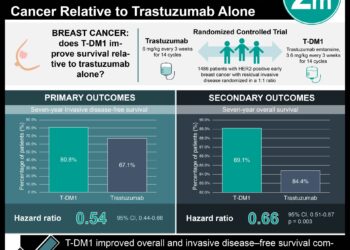Intake of fish fatty acids associated with lower risk of breast cancer
Image: PD
1. In a meta-analysis, higher consumption of dietary marine polyunsaturated fatty acids was associated with a lower risk of breast cancer.
2. No beneficial association was found with either overall dietary fish intake or ALA intake (a non-marine polyunsaturated fatty acid).
Evidence Rating Level: 1 (Excellent)
Study Rundown: The major finding of this meta-analysis is a dose-dependent decrease in breast cancer risk with increasing consumption of marine n-3 polyunsaturated fatty acids (PUFAs). Although research in animal models suggests PUFAs have cancer-fighting properties, investigations of PUFAs and cancer risk in humans has been inconsistent.
This study is one of the first to quantify an overall and dose-dependent association between types of PUFA intake and breast cancer risk. Inclusion of only prospective studies in this systematic review mitigates many potential sources of bias. However, study findings are limited by lack of information on BMI, a demonstrated confounder, in many of the studies. Additional prospective investigation of the relationship between marine n-3 PUFA intake, BMI, and breast cancer risk is merited.
Click to read the study in BMJ
Click to read an accompanying Press Release in BMJ
Relevant Reading: Uptodate: Fish oil and marine omega-3 fatty acids
In-Depth [systematic review and meta-analysis]: Researchers included English-language, prospective cohort studies evaluating the association between dietary intake of fish and n-3 polyunsaturated fatty acids (PUFAs) with the incidence of breast cancer in a systematic review and meta-analysis. In the cohort studies included, exposure levels were measured using both dietary intake and tissue biomarkers and classified by type of n-3 PUFA intake, specifically dietary fish, marine n-3 PUFAs or non-marine PUFAs.
Overall, 26 publications met inclusion criteria, representing a total of 20,905 cases of breast cancer and 883,585 participants studied. Among the 17 articles evaluating the association of marine n-3 PUFA and breast cancer, n-3 PUFA intake was associated with a 14% decreased risk of breast cancer (RR=0.86, 95% CI=0.78-0.94). This effect estimate was more pronounced in models adjusted for BMI (0.74, 0.64-0.86) compared to those that were not (0.90, 0.80-1.01). Eight articles were eligible for dose-response analysis, which documented a 0.1g/day increase in dietary marine n-3 PUFA was associated with a 5% lower risk of breast cancer (0.95, 0.90-1.00). No association was found for overall fish intake or ALA exposure.
By Maren Shapiro and Leah Hawkins, MD, MPH
More from this author: USPSTF recommends chemoprevention for women at high risk for breast cancer, IUD contraception equally safe in teenagers as in older women, Black men less likely to receive follow-up for elevated prostate cancer marker, PSA, More U.S. women using emergency contraception pill, No-cost contraception reduces unintended pregnancies
© 2013 2minutemedicine.com. All rights reserved. No works may be reproduced without written consent from 2minutemedicine.com. Disclaimer: We present factual information directly from peer reviewed medical journals. No post should be construed as medical advice and is not intended as such by the authors or by 2minutemedicine.com. PLEASE SEE A HEALTHCARE PROVIDER IN YOUR AREA IF YOU SEEK MEDICAL ADVICE OF ANY SORT. Content is produced in accordance with fair use copyrights solely and strictly for the purpose of teaching, news and criticism. No benefit, monetary or otherwise, is realized by any participants or the owner of this domain.







